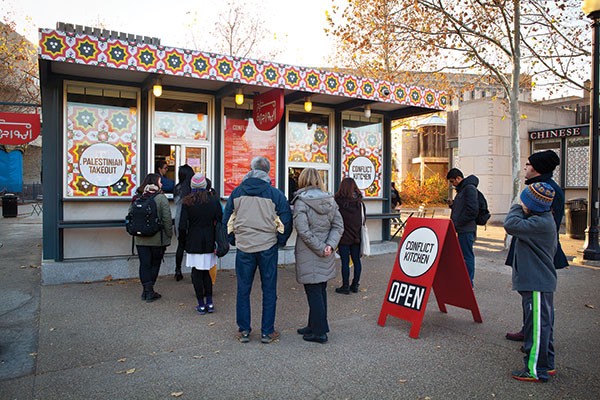If there was ever a time to get kosher or halal food in Pittsburgh while at the same time engaging in discussion about the Israeli-Palestinian conflict, this is it.
Two events planned this week are the latest development in a back-and-forth that's been ongoing since Conflict Kitchen began serving a Palestinian menu this fall. Conflict Kitchen is an art project run by Carnegie Mellon University that serves food from countries with which the U.S. is in conflict. Death threats closed the restaurant over the Nov. 8 weekend, and since then community conversations have increased, and media coverage has been global.
On Nov. 18, Conflict Kitchen, hosted a Palestinian potluck dinner at the East Liberty Presbyterian Church for the public to "meet, talk and break bread with Palestinians from the Pittsburgh community."
On Nov. 19 and 20, on both the Carnegie Mellon University and University of Pittsburgh campuses, students will hold pop-up restaurants called "CoExistence Kitchen" to raise awareness about peace efforts between Israel and Palestine.
Conflict Kitchen reopened Nov. 12 and was greeted by a line of customers.
"I think what [Conflict Kitchen does] is amazing in giving a voice to victims of conflicts who are typically silenced," says Calvin Pollak, a Carnegie Mellon Ph.D. student in rhetoric, who visited Schenley Plaza one week ago for the re-opening of Conflict Kitchen.
Pollak sat over a steaming bowl of maftoul — a Palestinian dish of chickpeas, slow-cooked chicken and couscous. Despite the long line and the swarm of media — from local reporters to the Washington Post — Pollak, who is of Jewish heritage, came out in support of the restaurant, which has received criticism for being "anti-Israeli" and anti-Semitic.
"I think it's anti-Semitic to believe that all Jewish people must support everything that the state of Israel does," Pollak says. "Jews are just as diverse as any other cultural group."
Much of the media coverage and criticism has been over funding from the Heinz Endowments and about information pamphlets — sometimes used as to-go wrappers — that the restaurant hands out with each order.
It's no surprise that Fox News ran a headline on Oct. 24 reading, "Anti-Israeli restaurant receives funding from John Kerry's wife's foundation." A statement from the Jewish group B'nai B'rith International followed, asking the Heinz Endowments to publicly "disavow" its grant recipient. Heinz distanced itself in a statement but has since run a clarification defending the "right of artists and arts organizations to express their work freely and without fear of reprisal."
Locally, the Pittsburgh Post-Gazette ran a story on Nov. 6 focusing on the text on the food wrappers. Conflict Kitchen countered with its own statement criticizing the coverage.
The wrappers include anecdotes from Palestinians that restaurant staff interviewed this summer.
One quote reads, "It's a Bedouin tradition to serve tea and coffee to guests," while another reads, "Water, land and government services are taken away from Palestinians and given to Jewish settlers. ... They are creating a refugee problem. Israel knows this. They intend for the settlers to never leave."
"Those quotes have to be taken in the context of the conflict that's occurring, and often the people that are saying things about their experience are traumatized by the events that are happening," says Palestinian-American Omar Abuhejleh, owner of Allegro Hearth Bakery in Squirrel Hill and a public-interest attorney. "The problem often is that people look at those visceral reactions and rather than engaging them and talking about them, they want to silence them because they disagree."
Conflict Kitchen says the voices are "central" to their project and that highlighting people's lives in those regions is the entire point. They've handed out the same types of pamphlets with past menu themes — Iranian, Venezuelan, North Korean and Cuban.
The Jewish Federation of Greater Pittsburgh, which has criticized Conflict Kitchen's approach, says the problem goes deeper than pamphlets. The group says it is also troubled by Conflict Kitchen's partnerships.
"Here's where their argument [for a Palestinian narrative] fails the litmus test," says Gregg Roman, director of the federation's Community Relations Council. "They're not just offering the point of view of people they interviewed. They're partnering with organizations and people that demonize Israel's right to exist."
Throughout October, Conflict Kitchen hosted events featuring Laila El-Hadded, a blogger also known as Gaza Mom, who gave a talk and dinner; hip-hop artist Jasiri X, who introduced a screening of the film Slingshot Hip-Hop, about music in Palestinian areas; Pitt professor Ken Boas, chair of the board for Israeli Committee Against House Demolition-USA; and Pitt's chapter of the Students for Justice in Palestine.
Roman says these individuals and organizations are part of the so-called BDS movement — boycott, divestment and sanctions against Israel. The Jewish Chronicle wrote that Boas' talk at Conflict Kitchen in early October became a "wholesale condemnation of Israel."
Roman says the Jewish Federation stands behind Conflict Kitchen's mission to promote understanding and that the death threats against the restaurant were "reckless, irresponsible and despicable." But when it came to holding events at the restaurant, the federation says Conflict Kitchen rejected the federation's suggestions of Palestinian guests who stood for co-existence.
"There's one thing to offer a narrative that is just a person's point of view, but it's another thing to take that narrative and turn it into a political statement," Roman says. "That's what they're doing when they partner with these organizations. ...We're not trying to negate the Palestinian perspective, we're just asking them to be honest and not to warp reality."
Conflict Kitchen co-director Dawn Weleski says they have never censored audience members and have provided a safe environment for people to speak.
El-Haddad, who is based in Maryland, has responded on her blog in the wake of the criticism, saying that people have a hard time handling a stand-alone Palestinian narrative without the counterbalance of an Israeli response.
"It [the pamphlet and events] was really nothing more than Palestinians speaking about their lives, and that's the point," El-Hadded said in a phone interview. "It's not supposed to be something edited or politically corrected or whatever."
If conversation was what Conflict Kitchen was looking for, it certainly got its wish. Meanwhile, Pittsburghers can get used to this global issue playing out in the form of food. Conflict Kitchen says it will continue serving its menu until mid-March as planned, and Abuhejleh, owner of Allegro bakery, has plans to open a new café with Palestinian fare.















